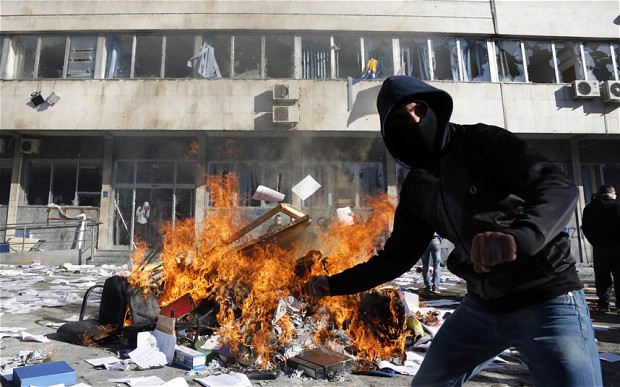Instability in Bosnia-Herzegovina - a foreseen end
(VOV) - Bosnia-Herzegovina was separated from Yugoslavia after the 1992-1995 ethnic conflict ended. For the first time in 20 years, Bosnia-Herzegovina has again become a hot spot in Europe because of anti-government protests. However, what’s now happening there has long been foreseen.
Protests began on February 5 in Tuzla city, an industrial center in the northeastern region. A wave of protests quickly spread to the capital Sarajevo and 20 other cities. Hundreds of people have been injured in clashes with police. The Presidential Council building and a number of other government buildings have been damaged or destroyed. The mayors of Tuzla, Zenica, and Sarajevo have already resigned.
Crippling economy, political division: main causes of instability
Lingering economic difficulties are the primary cause of instability in Bosnia-Herzegovina. Although it has been an independent country for 20 years, it remains one of the poorest nations in Europe. Protestors have expressed their anger at the government’s failure to restore the economy.
 |
According to the Central Bank, the unemployment rate in Bosnia-Herzegovina fluctuates between 27.5% and 44%, the highest in Europe. The youth unemployment rate is 25% and one fifth of the 3.8 million population lives below the poverty line. World Bank South East Europe Director Ellen Goldstein said these statistics are quite shocking and must be tackled immediately.
In addition, according to Transparency International, corruption in Bosnia is worse than in any other country in the Balkan region.
The political system is deeply divided. Observers say that the agreement ending the 1992-1995 ethnic conflict weakened the central government’s political power and cut the country into 2 autonomous regions. While Bosnian leaders wanted to consolidate power in the central government, conservative Croatians insisted on strengthening autonomous institutions.
EU not to rule out sending troops to Bosnia-Herzegovina
To prevent instability from spreading to the entire region, EU High Representative for Foreign Affairs and Security Policy, Catherine Ashton, called on Bosnian leaders to respond to public demands and try to stabilize the situation. British Foreign Secretary William Hauge described what has happened in Bosnia as a wake-up call. High Representative for Bosnia and Herzegovina Valentin Inzko even considered the possibility of sending EU troops to Bosnia-Herzegovina if the instability there increases. Inzko said if tensions continue the EU will not rule out sending troops there.
The US embassy in Sarajevo has urged Bosnian leaders to listen to the protestors’ demands and quickly end the violence.
The Prime Minister of neighboring Croatia, Zoran Milanovic, has called on the EU to help Bosnia-Herzegovina address its problems and become an EU member.
Feasible solution: early election
In the face of escalating tensions and international pressures, two parties in the ruling coalition have called for an early election. The Social Democratic Party (SDP) stressed the need to end violence, restore security, and conduct an early election. Member of the Presidential Council and the Party of Democratic Action, Bakir Izetbegović, said the people of Bosnia-Herzegovina want a change and they deserve a chance to elect someone they trust.
Observers say the new leaders need breakthroughs to develop the economy and remove Bosnia-Herzegovina from the list of the poorest countries in Europe. What matters most now is finding some way out of the current crisis.
